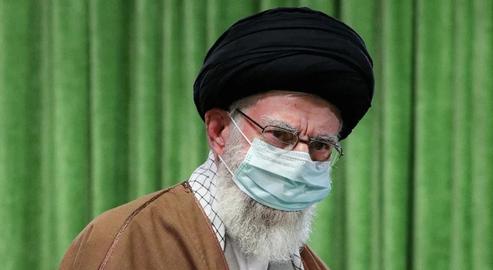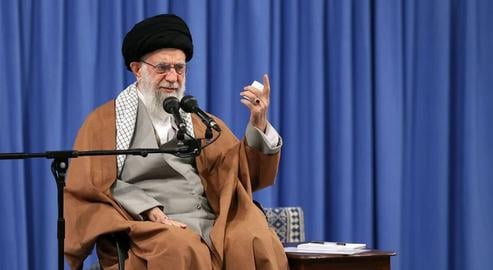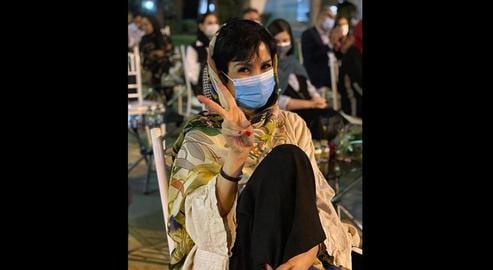Twenty years ago, the Supreme Leader of the Islamic Republic infamously called parts of the Iranian press a “base for the enemy”. Days later, mass bans and wide-ranging closures were imposed on Iranian newspapers, leading in turn to an exodus of journalists.
Now Ayatollah Khamenei has described the internet in the same terms, once again raising the spectre of new controls on cyberspace. In his speech on the first day of the Iranian New Year, the Supreme Leader claimed that “enemies” were using the internet to discourage Iranians from political participation.
"All countries in the world manage [access to] cyberspace,” he said. “But in our country, some are proud of that cyberspace is free, while this method is nothing to be proud of at all.” He went on to stress that the digital sphere should not be “ceded to the enemy”.
Khamenei’s speech also touched on an array of matters of huge interest to the international media: most notably, his stance on the “rushed” signing of the original JCPOA and his provisions for the upcoming presidential election. But the ominous remarks on cyberspace caught the attention of many Iranians, who still remember their sinister precursor two decades ago.
In his 2001 speech against “enemies” in the Iranian media, Khamenei had asserted to a thousands-strong gathering of young supporters that elements of the Iranian media were working hand-in-glove with foreign powers as part of a “propaganda conspiracy”. “It is as if 10 to 15 newspapers are run from a single center, with the same headlines in all cases,” he said, adding that their imperative was “to divide, to create discord, to create convulsions, to disturb public opinion, and to disperse” and “to desecrate the fundamental principles of Islam”.
After that speech, the shoring-up of the Iranian press began in earnest and one of the principal achievements of Mohammad Khatami's government was destroyed. Now the only media outlets that remain inside Iran are those either wholly-owned and controlled by the state, or those that practice rigorous self-censorship.
Internet access in Iran has already been severely curtailed. But Khamenei’s fresh claim that the digital sphere is being used by foreign “spy agencies” to “discourage people and also the prosperity of elections” indicates that he wants this to be taken further. To whit, he wants a national Iranian internet.
Khamenei has repeatedly criticized the failure to launch a national information network in the past. Six months ago, he described the internet as the locus of “soft warfare” by Iran’s “enemies” and told members of the government: “Cyberspace is being operated from outside of our control, without our authority."
In a meeting with police commanders two years ago, he also cited the killing of a cleric in Hamedan to evidence the point that weapons sales take place on the internet. “Cyberspace has its advantages, its possibilities, its dangers, its great dangers,” he said. “If this environment is unsafe for the people, the people will suffer.”
The Powers of the President
With mere months to go before the Iranian presidential election, the leader of the Islamic Republic, as in the past, used part of his Nowruz address to encourage people to participate. But this time, he also directly addressed the issue of the powers of the president.
Khamenei claimed that the vast majority of the country's decision-making bodies were "more or less" in the hands of the country’s most senior elected official. Other parastatal institutions, he said, were “nothing” compared to those within the president’s purview. He added: “The judiciary and military apparatuses’ level of control is only slightly over zero, compared that of the president."
He also alluded to remarks made about the Khatami presidency by reformist politician Behzad Nabavi, who had said the president held only 15 percent of the country's power. For his part, Khamenei said, he did not know how such a figure had been calculated.
In his speech, the Supreme Leader also outlined his criteria for June presidential election candidates, effectively saying he did not want the next president to be “a suit”. He said the president should be “justice-seeking and anti-corruption", and "believing in internal capabilities and believing in the youth”.
He also implicitly addressed members of the current government, such as Mohammad Javad Zarif and Hassan Rouhani, saying they had “rushed” into signing the original JCPOA. He also repeated a rebuke that he had issued to Javad Zarif some years ago, stating: “One of the gentlemen said something about defense. I told them to give him a tour to see the defense capabilities of the country."
The Main Impediment to a Good Turnout? Step Forward, Ayatollah Khamenei
Moments after speaking of the vast powers of the presidency, the Supreme Leader then took it upon himself to comment on the fate of the JCPOA in a manner that contrasted with the words of Hassan Rouhani. The United States should "lift all sanctions”, he said. “We will verify it and return to the JCPOA if they are lifted. The risk of rushing is more in the sense of wasting opportunity. We rushed into accepting the JCPOA; we should not have rushed.”
Four days earlier, President Rouhani had said that "even an hour" of delay in lifting sanctions was a betrayal. He also accused the opposition of "creating obstacles" to the lifting of sanctions on the pretext of the presidential election.
Rouhani is in a hurry to see the US return to the JCPOA during his tenure as president so that he can cash in on this during the election. But in practical terms, he needs the assent of the Supreme Leader of the Islamic Republic to do so, and there is still no sign that Khamenei is inclined to give him this concession.
In his speech, Khamenei showed no sign of wanting to see in a new president close to either Rouhani or the reformists. The address of the Supreme Leader before the presidential election is usually a coded message to political groups, on which basis they will predict the likely political atmosphere of the coming vote.
In recent months, Khamenei has repeatedly used the term "young revolutionary" to describe his ideal new government, and in his Nowruz message, he also spoke of wanting a "fresh" new president.
Despite this, he also continues to call for better turnout in elections: an issue that has come about as a direct result of his own interference. Last year Khamenei refused to confirm the eligibility of countless parliamentary candidates, which led to a vast majority of low-grade conservative MPs in the legislature who are even ridiculed by their own peers. Without the presence of a diverse array of candidates, there will be another serious decline in turnout. In addition to the reformists, Mahmoud Ahmadinejad's faction is also presently having difficulty in securing the Supreme Leader’s approval for its main candidates in June.
Successive disasters including the November 2019 protests, the economic crisis and frustration with the Rouhani administration’s performance are already likely to lead to lower turnout than usual this year. To increase participation, Khamenei must approve a mixture of presidential candidates – and accept the possibility that the outcome may not be what he wants it to be.
To some extent, Khamenei's concerns about participation will be less acute than they were in the past. Successive waves of popular unrest have raised hopes among some Iranians for a change of regime, and if the numbers do remain low in this election period, officials can blame it on the coronavirus outbreak.
In addition, for several years now, conflict between Iran and the US has been a much more pivotal concern for Khamenei than domestic politics. The removal of Donald Trump has been a cause for relief. As such, it appears that the Supreme Leader still intends to influence the election and its management, and is not yet seriously worried about the outcome.
Related coverage:
Iran’s Internet Censorship – A Guide
Plans for a National Intranet will make Iran More Isolated
Veteran Photographer: Political Coverage in Iran is Finished
Weekly Khamenei Report: A Job Description for the Next "Young Revolutionary" President
visit the accountability section
In this section of Iran Wire, you can contact the officials and launch your campaign for various problems



























comments